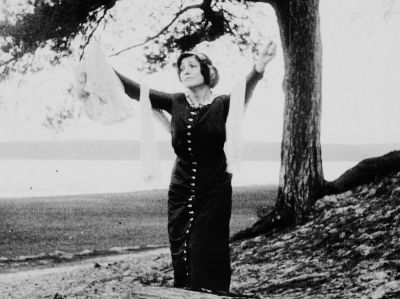
Il doppio. Max Mack
DER STELLUNGSLOSE PHOTOGRAPH (Germania/1912) R.: Max Mack. D.: 6'. Did. tedesche
ZWEIMAL GELEBT (Germania/1912) R.: Max Mack. D.: 26'
ONÉSIME CONTRE ONÉSIME (Francia/1912) R.: Jean Durand. D.: 9'. Did. inglesi
DER ANDERE (Germania/1912-1913) R.: Max Mack. D.: 70'. Did. tedesche
Accompagnamento al piano di Neil Brand
Il regista tedesco Max Mack nacque nel 1884, nel 1933 emigrò a Londra, dove morì nel 1973. Dopo aver lavorato in provincia come attore di teatro tra il 1906 e il 1910, passò a Berlino e al cinema, alla Vitascope di Jules Greenbaum, scrisse sceneggiature per Viggo Larsen e altri, e tra il 1911 e il 1935 diresse un totale di 127 film. Tredici di questi si sono conservati, vale a dire che qualcosa se n'è conservato. Si può dire che un film sia conservato, quando ne esistono soltanto copie spettrali di un vecchio controtipo negativo 16 mm, come nel caso di Der Andere (1912-1913)? Cosa si può dire di un regista quando il novanta per cento delle sue opere è andato perduto? Che era versatile: i tre film del programma si collocano su registri estetici ed emotivi del tutto diversi. Che era direttamente partecipe delle tendenze cinematografiche internazionali, senza inerzie culturali di matrice germanica. Der stellungslose Photograph, Zweimal gelebt e Der Andere sono rappresentativi della produzione internazionale del 1912 e valgono qui a rappresentare numerose altre pellicole che trattano di perdita di sé e sdoppiamento della personalità o che mostrano film nel film, come Les Mystères de Roche-Kador, Sur les Rail, Fortunes of a Composer, Dr. Jekyll and Mr Hyde. Che riuscì sorprendentemente a comprare da Paul Lindau i diritti per la sua pièce Der Andere, del 1893, e a indurre Albert Bassermann, detentore dell'Anello di Iffland (il più alto onore per un attore di lingua tedesca) e celebratissimo nei teatri di Berlino, a interpretare il ruolo del dottor Hallers anche nella versione cinematografica. "Hallers sente Agnes che, al piano di sopra, suona al pianoforte la Sonata al chiaro di luna di Mozart [sic!]; il suo volto assume un'espressione di pace e tranquillità. Pieno di riconoscenza, portando lo sguardo verso l'alto: Ah! La mia musica celestiale... la cara Agnes... Tu mi induci alla calma. Di lì a poco l'espressione del volto si fa grave, cupa, si altera, quasi sentisse dolore. L'uomo si volta di qua e di là sulla sedia, con gli occhi chiusi. Diventa irrequieto" (Der Andere, opera in quattro atti di Paul Lindau, Dresda 1893).
German director Max Mack was born in 1884, fled to London in 1933 and died there in 1973. From 1906 to 1910 he was a provincial stage actor, before moving to Berlin and into the cinema, at Jules Greenbaum's Vitascope studio. There he wrote screenplays for Viggo Larsen and others. He directed a total of 127 films between 1911 and 1935. Thirteen of these are known to have survived, or more or less survived. Can a film be said to exist if all that remains are ghostly prints from an old 16mm dupe negative, as is the case with Der Andere (1912-1913)? Can we say anything about a film director when 90% of his works are lost? We can certainly say that he was versatile - the three films in this programme are in completely different aesthetic and emotional registers. And that he was a prompt participant in international cinema trends. Der stellungslose Photograph, Zweimal gelebt and Der Andere are characteristic of what was being produced internationally in 1912 and can represent here the many films dealing with loss of self and split personality or featuring films within films, such as Les Mystères de Roche-Kador, Sur les rails, Fortunes of a Composer and Dr. Jekyll and Mr Hyde. And we know that he managed, amazingly, to acquire from Paul Lindau the rights to his 1893 play Der Andere and to induce Albert Bassermann, recipient of the Iffland Ring and the most celebrated stage actor in Berlin, to play Dr. Hallers in the film version as well. "From the floor above he hears Agnes playing Mozart's [sic] Moonlight Sonata on the piano: Hallers' face takes on a calm, peaceful expression. Gratefully, looking up: Ah! My music of the spheres... dear Agnes... You calm me down. After a short while his expression darkens, becomes grave, contorted, as though with pain. He twists back and forth in his chair, eyes closed. He becomes restless" (Der Andere, Play in four acts by Paul Lindau, Dresden 1893).

Tariffe:

Numero posti: 174
Aria Condizionata
Accesso e servizi per disabili
Il nostro cinema aderisce al circuito CinemAmico: è possibile utilizzare l’applicazione MovieReading® per i film di cui è prevista audiodescrizione e/o sottotitolazione sull'applicazione.
Tel. 051 2195311











